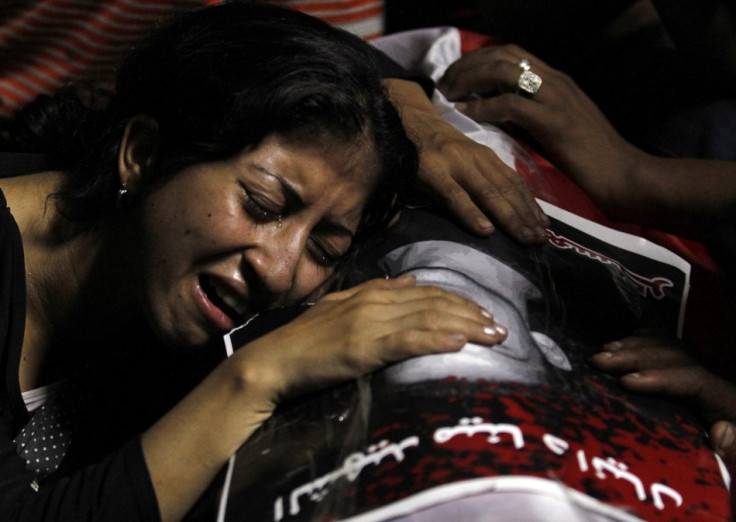Egypt: Hunger Strike and Military Trials of Civilians Puts the Revolution in Crisis

Laila Soueif, the mother of the prominent activist and blogger Alaa Abd El Fattah, currently in prison under investigation has announced she began a hunger strike Sunday, to oppose the imprisonment of her son by the country's ruling military council, accused of represing activists and religious minorities.
According to the "No Military Trials" group, the hunger strike was announced in a telegraph sent to the general prosecutor. It started on 9 October after violence erupted during a protest led by Coptic Christians and killed at least 27 demonstrators and soldiers, in Maspero, Cairo.
While state television first blamed the violence on armed gangs, protesters and witnesses accused the army of violently dispersing the demonstrators by running them over with their vehicles and using live ammunition.
Meanwhile the Egyptian state run TV has been accused of inciting the public against the "Coptic protesters" by calling on citizens to take to the streets to "protect the army."
The violence caused an outcry of criticisms against the Military Council, which many accused of using the same brutal tactics employed under Egypt's former leader Hosni Mubarak during the protests that led to his overthrow.
After the violence, the army announced it had started an investigation and arrested several people.
However Egyptians complain that several Christian Coptic and regime dissidents have been wrongly arrested.
Among them is Abd El Fattah who has been accused of inciting violence during the October protests and is, as a result, being held under investigation.
However his charges have now changed and the blogger is accused of "stealing a military weapon" and "assaulting armed forces."
The activist widely criticised the army's reaction following the protests and refused to answer questions from the military prosecutors "in a case where the military is accused of committing a massacre when their APCs ran over peaceful protesters in front of Maspero on Oct. 9," said his lawyer Ahmed Seif Al-Islam said.
He is also credited for convincing the families of the Maspero Coptic victims to agree to have the bodies of their relatives autopsied to obtain proof that the military caused their death.
Abdel Fattah is considered one of Egypt's pioneer bloggers, along with his wife, Manal Hussein, and both have been publishing their political opinions in well-known blog www.manalaa.net, since 2004.
Now his mother, also a university professor has announced she entered a hunger strike to protests against the detention of her son.
"I started a hunger strike this morning and I sent a notification to the prosecutor," Soueif told Al-Masry Al-Youm. "I presume a hunger strike could pose a pressure on the amount of time he will be detained for. At the end of the day, this is a simple and straight demand."
Fattah's arrest has highlighted a number of pressing issues met by protesters and civilians throughout the aftermath of the revolution.
The military trial of civilians has been made even easier since the fall of Mubarak, following the extension of the emergency laws announced after the violence against the Israeli embassy in Cairo.
Rights activists say the number of civilians who have gone through military trials in the past 8 months to have reached 12,000 people, prompting fears that despite the fall of Mubarak, criticisms of the regime are still being brutally repressed.
Also, according to defence lawyers of those jailed in relation to the October 9 violence some of the detainees were not present at the Maspero protest and were arrested just for "being a Christian."
Three of them were reportedly under 16 years old and another was forced to have an operation to extract a bullet from his jaw and was chained to his bed in hospital, according to defence lawyer Ibrahim Edward. "After the operation he was sent straight to prison where he cannot eat without feeding tubes, so he lives on juices."
It is not the first time that Fattah is in detention as he was arrested in 2006 while participating in a peaceful protest calling for a more independent judiciary system and was detained for 45 days.
This time however, the arrests and military trials of civilians while the regime itself has been accused of targeting civilians during protests has angered Egyptians, infringing even more on the fragile relationship they have with a military institution that has supported their ousted leader for years.
© Copyright IBTimes 2025. All rights reserved.





















